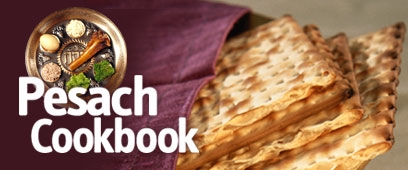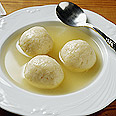
The hard-boiled eggs dipped in salt water were a sign of the beginning of the meal. The more you cooked them, the harder they would become, so too are the Jews: the harder you persecute them, the stronger and tougher they become, would be one explanation for eating the eggs.
Another explanation: Eggs are food for mourners, a reminder of the destruction of the temple; its shape is round like the circle of life. Since the sacrifices were salted before they were brought to the altar of the temple, so too we serve eggs in salt water.
“Who knows why we eat eggs in salt water?” there was always someone who would ask this question in front of our curious eyes. “In memory of the children of Israel who crossed the Red Sea and soaked their enemies in salt water”, he would laugh with us.
Afterwards, chicken soup would be served with Maceszos Gomboc, the famous matzo balls. An entire year we would wait for them, and when they would roll onto the table they would be snatched up as if no one knew that there were endless courses on the way and that we should not fill up now.
Over the years, even the non-Jews have developed a taste for the gray balls. Today you can find them on the menus in the fanciest restaurants in Budapest. Yes, Hungarians have good taste. It is just that the search for the afikoman and waiting for Elijah the prophet to come to the door pales in comparison to the anticipation for the next morning’s breakfast.
The crumbs that they make, the constipation, even the deafening noise of their crunch does not matter. When you are talking about Maceszos Kave (matzos in coffee) all the troubles are forgotten. We overcame Pharaoh? We will overcome this as well.
The idea is simple: You soften the hard matzos in a cup of hot sweet coffee and eat it with a spoon. It is a type of kosher for Passover cornflakes. The Jews of Hungary have been drinking coffee with matzo for generations, and the laws of the traditional holiday breakfast are transmitted like the Passover story. Maybe you will come over for coffee - with matzos?
Even though Maceszos Kave is a meal in itself, we would never give up the opening of the holiday with eggs and matzos (Maceszos Tojas). A matzo omelet, also called matzo brei, adorned with melted cheese, and served with salad and cottage cheese. The bread can wait.
There are stories told of Uncle Cohen or Kohn Bacsi - the Hungarian Hershele- who decided to go to Israel. He arrived at the airport with five small suitcases. The security agents opened the first bag and found a knife. They asked Uncle Cohen: “Why do you have a knife? You know that you can not take silver instruments out of the country”. He said to them: “I am a religious man who observes the commandments. I need the knife in order to eat meat”.
“Fine, take it”, said the security men and then moved on to the second bag. They opened it and found another knife inside. “What is this knife for?” they asked. “I am a religious man who observes the commandments. I can not use a meat knife to eat dairy”. “Fine, take it”.
They opened the third bag and found another knife. “You know that the Jews have the Passover holiday where they are forbidden to eat leavened bread”, said Uncle Cohen. “Do you think I can eat matzo with the knife that I used during the year on leavened bread?” he said as they opened the fourth bag and found the knife for eating dairy on Passover.
Then they opened the fifth bag - and there they found another silver knife. “And what is this knife for?” the security men asked furiously. “This knife”, said Uncle Cohen. “I use to eat bacon and ham”.
Coffee with matzos (Maceszos kave)
Ingredients (for one serving)
1-½ matzos
1 C. milk
1 tsp. instant coffee
sugar according to taste
What to do
Break the matzos into 1-inch pieces and place in a coffee cup.
Prepare the coffee: Boil milk and dissolve in it coffee and sugar.
Pour the hot coffee on the matzos in the cup and wait a minute or two until they absorb the liquid and become soft.
Egg with matzo (Maceszos tojas)
Ingredients (for 4 servings)
4 matzos
4 eggs
milk
salt according to taste
black pepper according to taste
oil/butter for frying
What to do
Beat the eggs. Add a drop of milk and salt.
Wet the matzos and break them into 1-inch pieces.
Pour the mixture into a greased hot frying pan, spread it out and fry on both sides until golden.
Note: Some people separate the eggs, beat the whites and fold them into the yolk, milk and matzo mixture. Others soak the matzos in warm milk. You can enrich the dish with slices of cheese, which you place on the omelet while frying. You can also make it sweet, by not adding salt and pepper, and sprinkling it with sugar when serving.
Matzo flakes (Maceszos tarhonya)
Ingredients
2 matzos
2 T. oil or goose fat
1 onion
2 eggs
water
What to do
Break the matzo into little pieces. Beat the eggs.
Dice the onion and sauté in oil until golden. Add the matzo pieces.
Add a small amount of water. Mix and add the eggs.
Ofer Vardi is a journalist who loves to eat, especially Hungarian food, and who does not know how to close his mouth
















